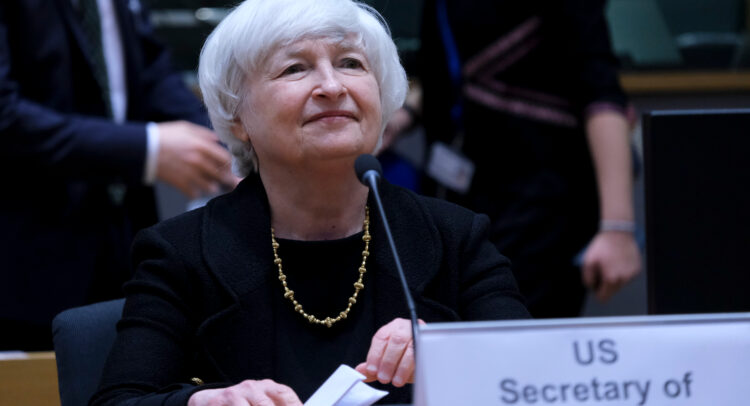The U.S. Department of Treasury shared a statement that it sent to the International Monetary Fund (IMF) regarding the state of the U.S. economy. The statement is in response to recommendations the IMF proposed to the U.S. Here’s a breakdown of the key points that market watchers would be particularly interested in.
Elevate Your Investing Strategy:
- Take advantage of TipRanks Premium at 50% off! Unlock powerful investing tools, advanced data, and expert analyst insights to help you invest with confidence.
Economic Growth: A Steady Climb
The Treasury statement highlights the resilience of the U.S. economy and points to steady growth despite global uncertainties. Recent GDP figures show an upward trend driven by robust consumer spending and business investments. The Treasury’s positive outlook suggests confidence in the economy’s ability to sustain this growth trajectory. For market watchers, this steady growth indicates potential opportunities in sectors like consumer goods and capital investments, which are benefiting from increased spending and investment.
Labor Market: Solid Gains
According to the Treasury, the U.S. labor market continues to strengthen, with unemployment rates hovering near historic lows. Job creation has remained above trend, contributing to wage growth and increased consumer purchasing power. This strong labor market underpins consumer confidence and spending, which are critical for economic expansion. Investors should consider sectors that thrive on consumer spending, such as retail and services, as they stand to benefit from a confident and financially stable workforce.
Inflation: A Balanced Approach
Inflation has been in the spotlight, and the Treasury acknowledges its presence but emphasizes a balanced approach. The statement notes that inflation is gradually moderating thanks to strategic monetary policies. The Federal Reserve’s efforts to balance inflation while fostering growth are highlighted as key to maintaining economic stability. For investors, this balanced approach says that while inflation is being managed, sectors sensitive to interest rates, like real estate and finance, could see varied impacts depending on policy shifts.
Fiscal Policies: Strategic Investments
The Treasury emphasizes strategic fiscal policies aimed at long-term economic stability and growth. This includes investments in infrastructure, green energy, and technology. These initiatives are designed to enhance productivity and competitiveness. Market watchers should pay attention to industries aligned with these investments, as they are likely to experience significant growth and receive government support.
Global Trade: Navigating Challenges
Global trade remains a crucial element of the U.S. economic strategy. The Treasury underscores efforts to strengthen trade relationships while addressing challenges posed by trade disputes and supply chain disruptions. These efforts are essential for maintaining the flow of goods and services and supporting export-oriented industries. Investors should monitor developments in trade policies and their impacts on sectors like manufacturing and technology, which are heavily influenced by global trade dynamics.
Key Takeaways
The U.S. Treasury’s statement to the IMF paints an optimistic picture of the U.S. economy, marked by steady growth, a strong labor market, moderated inflation, and strategic fiscal investments. Market watchers should focus on consumer-driven sectors, interest rate-sensitive industries, and those benefiting from government investments in infrastructure and technology. Additionally, keeping an eye on global trade developments will be crucial for understanding the broader economic landscape.
As the economy navigates these factors, informed investment decisions will be key to capitalizing on emerging opportunities.
















